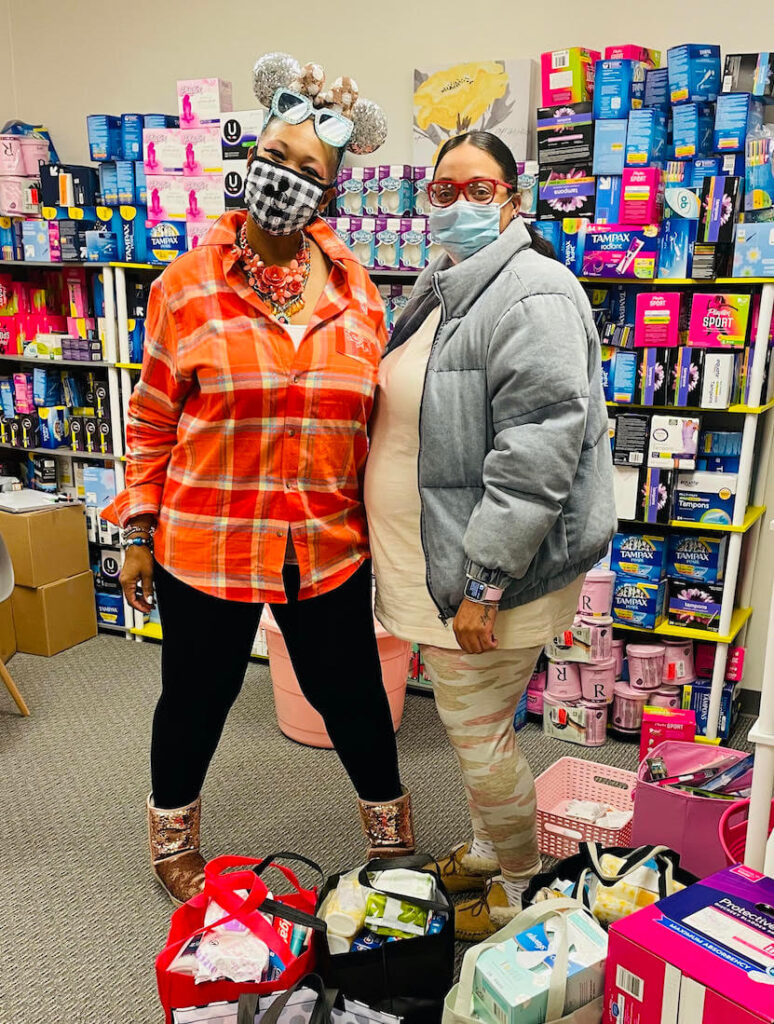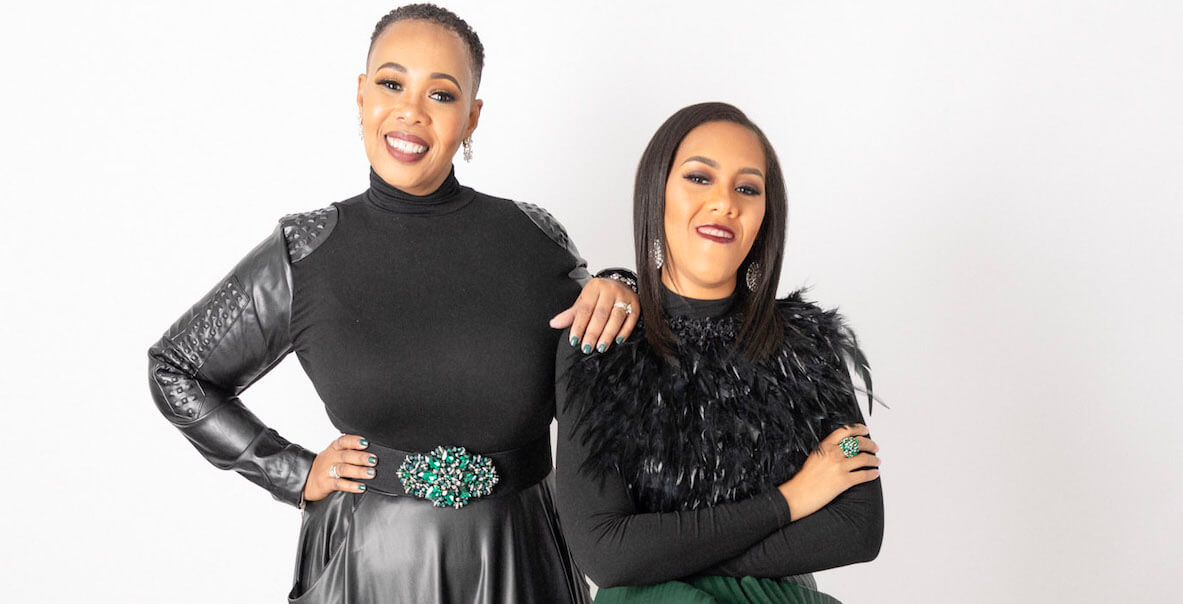When Lynette Medley was growing up, in a religious household in Philly, she was acutely aware of one topic that was never to be discussed: Menstruation. The women in her life rarely talked about their periods; connected to sexuality, the topic was considered shameful, so her family avoided discussing it all together.
So when she found herself struggling to afford pads and tampons for her and her daughter, Nya McGlone, after her ex-husband was incarcerated in 1996, Medley didn’t know where to turn for help. She knew her family would help her pay for food and other essentials; but she was embarrassed to say they needed menstrual products.
“It just wasn’t something that was talked about,” Medley says. “You would never say,I didn’t have menstrual products. You would never say,I’m struggling with this.”
A large 2019 study in St. Louis found that about 67 percent of low-income women are unable to consistently afford menstrual supplies. In a 2021 survey from the menstrual products brand U by Kotex, two out of every five women with periods reported that they were unable to afford supplies at some point in their life.
“I know as a college student, it’s hard to get money, especially for period products,” Wilkerson says. “Sometimes they have to pick between buying meals to eat or period products.”
Though her personal experience with period poverty is now behind her, Medley still sees the effects of it in her work as a sexual health counselor and educator. Public schools often offer menstrual products for free—though it is not required by law in Pennsylvania—per the foundation Free The Tampons. But students are often given only one or two products to last them until they get home. Many feel embarrassed asking for more—and some even take drastic measures.
Medley recalls sitting in her office about 10 years ago with a 15-year old girl who was forced to use rags or stuffing from old stuffed animals to manage her bleeding when she couldn’t access menstrual products. She’d now turned to stealing and engaging in risky sexual behavior in exchange for the supplies she needed.
“She basically said,Miss Lynette … one week out of the month, anything goes. I will have sex with people. I will steal. I will do whatever I can to get menstrual products for me and my family,” Medley recalls.
Medley began looking for services that offered pads and tampons on a monthly basis. But she found that many only gave away kits with one or two pads or tampons—not monthly supplies. As she sat in her office with the 15-year-old who was “fighting for her life over a pad or tampon,” Medley knew this needed to change.
In 2012, she and her daughter founded No More Secrets Mind Body Spirit, a nonprofit dedicated to fighting period poverty by giving out monthly supplies of pads, tampons and menstrual cups. When they first launched, they made between 80 and 85 deliveries a week, often at night in order to respect the privacy of the recipients. But they’ve grown fast: in just the past fourteen months, No More Secrets has given away over four million products.
A safe space
Medley and McGlone started working together on the project after McGlone, who earned a master’s degree in animal science, returned to the Philly area from Alabama. When she saw the work her mother was doing, counseling women and girls who were struggling with their menstrual health, she knew she wanted to get involved. Medley earned a master’s degree in human sexuality from Widener University in 2012, had previously studied mental health and social services as an undergrad, and was working as a counselor.
Related: Students should have access to menstrual supplies. Period.
Their different approaches to the work has helped them make the organization successful. Medley focuses on the educational and social services side, while McGlone strategizes to streamline and grow No More Secrets so it can reach as many people as possible. Both women are open about their experience with period poverty, which they believe helps them better connect with the communities they serve.
“We never hide the fact that this was our life,” Medley says. “We experienced period poverty.”

For years, the two women stored menstrual products in Medley’s therapy office and delivered them out of the trunks of their cars. When the Covid-19 pandemic reached Philly in 2020, they were inundated with requests—making about 250 deliveries per week at one point, in addition to shipping menstrual products nationwide to those in need.
During their deliveries, people shared with Medley and McGlone that they were not only struggling with the cost of the products, but access to bathrooms with clean and working water now that public bathrooms were closed.
To address this problem, Medley and McGlone opened SPOT Period in 2021, a menstrual hub in Germantown that offers access to clean bathrooms, free menstrual products, educational resources and a computer room with wifi. The name SPOT, stands for Safety Programming for Optimal Transformation. The space includes a safe room for marginalized women, named in honor of Breonna Taylor, where women of color can go when they’re feeling vulnerable and want to spend time in a safe, quiet place.
“We never hide the fact that this was our life,” Medley says. “We experienced period poverty.”
No More Secrets and SPOT Period work with doctors, nurses and community members who have struggled with menstrual health issues through their community advisory board. The seven-member board advises Medley and McGlone on what issues they think menstruators in the Philly-area are struggling with and how SPOT Period and No More Secrets can help.
Dr. Shawana S. Moore, DNP, MSN, CRNP, WHNP-BC, is one such member. Moore is the Director of the Women’s Health-Gender Related Nurse Practitioner Program at Thomas Jefferson University. She became involved with SPOT Period and No More Secrets after seeing Medley and McGlone present a poster about their work at Thomas Jefferson University’s Community-Driven Research day. She was attracted to the ways the two women center community within their nonprofit’s mission.
“They directly engage and involve the community in the center of what they do each day. They seek to include and amplify the voices of those impacted by period poverty and menstrual inequity in their work,” Moore says.
Tackling the stigma
The SPOT Period center has given Medley and McGlone a space where they can tackle some of the stigma surrounding menstrual health in our society. In addition to offering free products, Medley leads educational programming within the center on menstrual health and hygiene topics, including sessions on fibroids, endometriosis and Polycystic Ovary Syndrome (PCOS), which are often underdiagnosed and disproportionately affect Black women.
Each month, SPOT Period hosts #OMGPeriod, an educational series taught by Medley and Dr. Stacey Sassaman, M.D., M.S., a women’s health physician in Philly. They offer both in-person and virtual programming.
Both SPOT and No More Secrets’ work delivering menstrual products to those in need are funded entirely through donations. In October of 2020 they launched a GoFundMe to open SPOT Period and used the just over $10,000 raised to open the center in February of 2021. Since then, they’ve raised$94,233 through their GoFundMe, which has helped them buy products and make repairs after Hurricane Ida damaged their building. People can donate either menstrual products or funds to the center through their website. Medley and McGlone try to keep the center stocked with a variety of brands and products, including pads, tampons and menstrual cups, because they know menstruators may have different preferences based on their flow.
Related: Local high school student starts movement to fight “period poverty”
For Philly-native Lauren Barbara Wilkerson, Medley and McGlone’s work addressing the stigma surrounding periods was transformative. Wilkerson remembers being anxious and embarrassed to talk about her period with her peers because menstruation is so often treated with secrecy. When she met Medley last year at a drive for menstrual products that was being held at Lincoln University, she remembers learning to let go of the stigma.
“I was to the point that if you ask me a question about my period I would cry,” Wilkerson says.
 Wilkerson, who is a nursing student at Lincoln, is now the founder and president of Periodt, a menstrual supply hub on Lincoln’s campus that is sponsored by SPOT Period and a member of No More Secrets’ community advisory board. Lincoln’s menstrual hub has worked to provide products in campus bathrooms and has hosted educational events where they teach people to use menstrual cups. After graduating from Lincoln, she plans to work as a midwife and a nurse practitioner with a focus on neonatology, labor and delivery.
Wilkerson, who is a nursing student at Lincoln, is now the founder and president of Periodt, a menstrual supply hub on Lincoln’s campus that is sponsored by SPOT Period and a member of No More Secrets’ community advisory board. Lincoln’s menstrual hub has worked to provide products in campus bathrooms and has hosted educational events where they teach people to use menstrual cups. After graduating from Lincoln, she plans to work as a midwife and a nurse practitioner with a focus on neonatology, labor and delivery.
“I know as a college student, it’s hard to get money, especially for period products,” Wilkerson says. “Sometimes they have to pick between buying meals to eat or period products.”
Medley and McGlone hope to continue expanding No More Secrets and SPOT Period’s reach next year. They’re in talks with other campuses where they hope to sponsor menstrual hubs and recently raised $20,000 for a mobile menstrual unit that they can drive around the city to offer supplies and education.
“This is an extension of the work we’ve been doing in the community,” Medley says. “With this mobile unit coming to their communities, setting up these pop-up events and just being able to give them more resources is such a blessing.”
The Citizen is one of 20 news organizations producing Broke in Philly, a collaborative reporting project on solutions to poverty and the city’s push towards economic mobility. Follow the project on Twitter @BrokeInPhilly.
![]() RELATED
RELATED
Citizens of the Week: Joanie Balderstone and Rebecca McIntire
Header photo: Lynette Medley (left) and Nya McGlone



